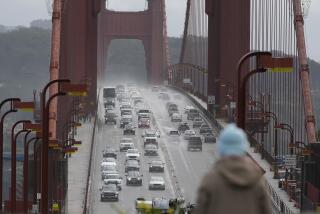Electronic Sensor System Planned : Dutch Consider Hi Tech to Ease Traffic
- Share via
ON THE A-1 MOTORWAY, Netherlands — It’s 8:30 a.m., and traffic is bumper to bumper on this eight-lane Amsterdam-area highway. A few yards away, commuter trains pass every 10 minutes.
The government wants to unclog the roads to improve the economy. But environmentalists worry about the ecosystem, and motorists worry about their freedom.
Included in the 20-year plan to upgrade mass transit and build more highways is a plan to plant electronic sensors that would track motorists at rush hour and periodically bill them for their use of the highways.
Traffic jams cost the Dutch economy an estimated $350 million a year in the 68-mile urban crescent that stretches from Rotterdam to Amsterdam to Utrecht in the central Netherlands.
The $15.5 billion transport plan, which must be approved by Parliament, reflects government concern that a faltering transportation system could irreversibly damage the Netherlands’ position as Europe’s major port of entry via Rotterdam.
Lost Time, Production Delays
Transport Minister Neelie Smit-Kroes says a 30% growth in highway traffic in the last five years has cost about $1.75 billion in lost working time and production delays.
The government forecasts that its car-curbing measures would lead to a slower growth of traffic--55% more in 2010 instead of 70%.
Environmentalists welcome mass transit improvements. But they contend that they will be neutralized by a highway expansion that could harm the already fragile ecosystem of this tiny nation of 14.6 million living in an area the size of Massachusetts, Connecticut and Rhode Island combined.
“It’s been shown time and again that improved roads attract more traffic, which in turn necessitates more roads--it’s a vicious circle,” says Willem-Jan van Grondelle of the Dutch Nature and Environment Foundation.
“To counter the colossal environmental problems ahead,” he says, “the use of private cars must be drastically cut.”
Influential Environmental Group
Van Grondelle’s privately-financed organization is the nation’s most influential environmental research group.
On the other hand, a spokesman for the Dutch motorists’ lobby, Henk Langeweg, says his group, with 2 million members, opposes the plan because it “limits our constituency in what it prizes most--its liberty.”
This is a car-oriented culture, with its 5 million private automobiles that provide freedom of movement in this crowded nation.
Under the plan, Transport Minister Smit-Kroes says that in the Rotterdam-Amsterdam area--an urban conglomerate of 3.5 million people--five new highway tunnels would be dug under major waterways.
In addition, about 620 miles of existing highways would be widened to increase their capacity about 40% and the electronic sensors would be installed.
‘Road Pricing’ System
The system known as “road pricing” is still in development. But it has already stirred considerable controversy because of it would be a means of registering the movements of a citizenry traditionally sensitive to any potential infringement of its liberties.
Despite the huge scope of the government’s gridlock remedy, both the automobile lobbyists and the environmentalists see little chance of ending the Dutch driver’s love for the open road.
“Huge traffic jams will be part of life here for quite a while,” says Langeweg. “Especially since most of the Dutch will only leave their car home on pain of death.”
More to Read
Sign up for Essential California
The most important California stories and recommendations in your inbox every morning.
You may occasionally receive promotional content from the Los Angeles Times.












